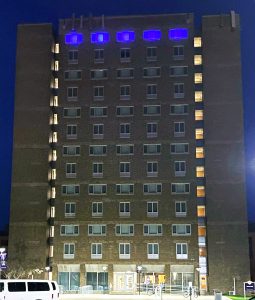As we approach the close of the spring semester at Winona State University, I’m struck by how different this year is from any other that came before it.
In the 162-year history of this university, there’s never been a semester quite like this. Classes were suspended for part of the Civil War, and there weren’t any commencement ceremonies between 1861 and 1866. There were widespread concerns during the Spanish Flu epidemic in 1918, when several WSU students became ill and others volunteered to make protective masks, just as many do today. During the Great Depression and World War II, there was talk of closing the university. But until now, never before were classes transformed into a different pedagogy halfway through a semester, and never before has the university transitioned the traditional commencement exercises into an alternate format.
Typically this time of year campus would be bustling—busier than ever with classes and students studying late into the night, research events, joyous celebrations of a new graduating class and the culmination of another academic year. Instead, it’s quiet, and eerily so, with classrooms and offices abandoned in the pursuit of protecting and preserving the greater good.
In the face of the unknown, despite the disruption and disconnection, what I’ve seen emerge are heroes—across the Winona community and throughout our Winona State faculty, staff and students.
Our faculty rose to the challenge to continue our commitment to our academic mission, translating the vigor and creativity of academic pursuit to digital channels—chat, video, simulation platforms. Thanks to our eWarrior program, formerly called the “laptop program,” WSU was uniquely positioned for success when this semester’s classes were forced suddenly to migrate online. In the first week of online education alone, our community hosted over 3,000 separate Zoom sessions, with a staggering total of more than 35,108 attendees. We are still “a community of learners” … just a virtual community.
WSU was also uniquely positioned to continue our commitment to improving our world. Through our eWarrior program, we were able to help institutions address their IT challenges, supplying laptops and iPads to higher education partners and healthcare facilities in and around the state. We inventoried resources campus-wide and found hospital beds, masks, and other supplies we could donate to local healthcare providers, and housing assets that could provide housing for medical professionals as well as serve as potential alternate care environments as needed.
We vow to continue to be good neighbors here in Winona and in Rochester so that our assets and expertise can benefit the communities we serve. This is simply what good neighbors do, just as Winona Health and many others have helped us time and again in the past. I continue to be impressed at every turn by the ingenuity, generosity and thoughtfulness I see present in our communities during this profoundly challenging time.
Many people are wondering what the future holds, and we don’t have an answer to that yet — much will depend on projections for the coming weeks and the guidance of public health officials. But what I can tell you is that Winona State will persevere. We survived the Civil War, World Wars I and II, the Spanish Flu epidemic, the Great Depression. We will survive this, and we will emerge stronger. But we couldn’t do that without the support of the greater community, and for that, I thank you.
Sincerely yours,
Scott R. Olson
President
